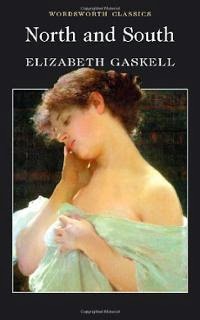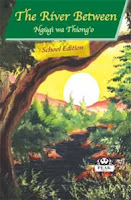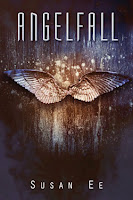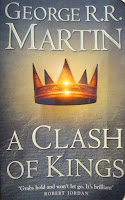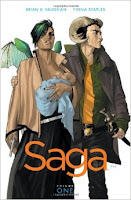"In short, the magnifying influence of fear began to set nought the calculations of reason, and to render those who should have remembered their manhood, the slaves of the basest of passions." 13
""Should we distrust the man, because his manners are not our manners, and that his skin is dark!" coldly asked Cora." 21
""When men struggle for the single life God has given them," said the scout sternly, "even their own kind seem no more than the beasts of the wood."" 47
"(...) it should be remembered that men always prize that most which is least enjoyed." 55 (notes)
""No, no; you are young, and rich, and have friends, and at such an age I know it is hard to die! but," glancing his eyes at the Mohicans, "let us remember, we are men without a cross, and let us teach these natives of the forest, that white blood can run as freely as red, when appointed hour is come."" 76-77
"...it is better for a man to die at peace with himself, than to live haunted by an evil conscience!"" 78
""There are evils worse than death"" 80
""And am I answerable that thoughtless and unprincipled men exist, whose shades of countenance may resemble mine?" Cora calmly demanded of the excited savage." 103
""Book! what have such as I, who am a warrior of the wilderness, though a man without a cross, to do with books! I never read but in one, and the words that are written there are too simple and too plain to need much schooling; though I may boast that of forty long and hard working years."
"What call you the volume?" said David, misconceiving the other's meaning.
"'Tis open before your eyes," returned the scout; "and he who owns it is no niggard of its use. I have heard it said, that there are men who read in books, to convince themselves there is a God! I know not but man may so deform his works in the settlements, as to leave that which is so clear in the wilderness, a matter of doubt among traders and priests. If any such there be, and he will follow me from sun to sun, through the windings of the forest, he shall see enough to teach him that he is a fool, and that the greatest of his folly lies in striving to rise to the level of one he can never equal, be it in goodness, or be it in power."" 117
""natur (sic) is sadly abused by man, when he once gets the mastery."" 121
"(...) history, like love, is so apt to surround her heroines with an atmosphere of imaginary brightness" 180
""Nothing but vast wisdom and onlimited power should dare to sweep off men in multitudes," he added; "for it is only the one that can know the necessity of the judgment; and what is there short of the other, that can replace the creatures of the Lord?"" 184
""Every trail has its end, and every calamity brings its lesson!"" 263
"(...) the Hurons were in no degree exempt from that governing principle of nature, which induces man to value his gifts precisely in the degree that they are appreciated by others." 281
"In short, he so blended the warlike with the artful, the obvious with the obscure, as to flatter the propensities of both parties, and to leave to each subject of hope, while neither could say, it clearly comprehended his intentions. The orator, or the politician, who can produce such a state of things, is commonly popular with his contemporaries, however he may be treated by posterity. All perceived that more was meant than was uttered, and each one believed that the hidden meaning was precisely such as his own faculties enabled him to understand, or his own wishes led him to anticipate." 283
"The eyes of the old man were closed, as though the organs were wearied with having so long witnessed the selfish workings of human passions." 294
""The Spirit that made men, coloured them differently, (...) Some he made with faces paler than the ermine of the forests: and these he ordered to be traders; dogs to their women, and wolves to their slaves. He gave this people the nature of the pigeon; wings that never tore; young, more plentiful leaves than the leaves on the trees, and appetites to devour the earth. He gave them tongues like the false call of the wild-cat; hearts like rabbits; the cunning of the hog, (but none of the fox,) and arms longer than the legs of the moose. With his tongue, he stops the ears of the Indians; his heart teaches him to pay warriors to fight his battles; his cunning tells him how to get together the goods of the earth; and his arms enclose the land from the shores of the salt water, to the islands of the great lake. His gluttony makes him sick. God gave him enough, and yet he wants all. Such are the pale-faces."" 301
""(...) who speaks of things gone! Does not the egg become a worm- the worm a fly- and perish! Why tell the Delawares of good that is past? Better thank the Manitto for that which remains."" 302
""'(...) When the Manitto is ready, and shall say, "come," we will follow the river to the sea, and take our own again.' Such, Delawares, is the belief of the children of the Turtle! Our eyes are on the rising, and not towards the setting sun! We know whence he comes, but we know not whither he goes. It is enough."" 311
""(...) no, Sagamore, not alone. The gifts of our colours may be different, but God has so placed us as to journey in the same path."" 349
""The pale-faces are masters of the earth, and the time of the red-men has not yet come again. My day has been too long. In the morning I saw the sons of Unâmis happy and strong; and yet, before the night has come, have I lived to see the last warrior of the wise race of the Mohicans!"" 350
AUTEURS' LIBRARY
Austen Jane
(1)
Barrie J. M.
(1)
Bowen Elizabeth
(1)
Cooper James Fenimore
(2)
Cronin A.J.
(2)
Dostoyevsky Fyodor
(1)
Ee Susan
(2)
Farland David
(1)
Fitzgerald F. Scott
(1)
Flewelling Lynn
(1)
Forster E. M.
(2)
Gaskell Elizabeth
(1)
Golding William
(1)
Grahame Kenneth
(1)
Harpman Jacqueline
(3)
Hobb Robin
(5)
Ishiguro Kazuo
(1)
Le Guin Ursula K.
(2)
London Jack
(1)
Martin George R. R.
(3)
Melville Herman
(1)
Murail Marie-Aude
(1)
Ngῦgῖ wa Thiong’o
(1)
Pilcher Rosamunde
(1)
Ryan Anthony
(2)
Salinger J. D.
(1)
Shaw George Bernard
(2)
Stegner Wallace
(2)
Steinbeck John
(1)
Stevenson Robert Louis
(2)
Tarkington Booth
(1)
Vaughan Brian K.
(1)
Webb Mary
(2)
Wharton Edith
(1)
Thursday, 30 April 2015
Wednesday, 29 April 2015
Auteur's library
James Fenimore Cooper
The Last of the Mohicans
1826
A seductive, old-fashioned, very narrative, tale of 18th-century racial and national conflicts which would come to shape today’s North America. Diffusing a barely hidden critique of a weak and hypocritical Christian society in favour of honour-bound and earnest Native American Tribes, and a union of the two, Cooper is always careful to compensate his almost childish praise of “Indian nature” by a “superior” trait conceded to his white audience. But in this dense relation, the author's prejudices (his relying on nature rather than culture) gradually become unimportant to allow you to enjoy the book and appreciate the characters in all their moderated worth, till you become part of their eternal landscape of woods and plains, mountains and rivers. What starts as a slowly paced critique of white conquest and its varied Native responses is quickly shadowed by the very thing they’re all fighting for, as North America itself becomes the most powerful character of the book. This is a sensual, tragic reading which, treacherously, and quite sadly, makes you forget to care for who wins, who loses; in this narration, all that matters is the journey: quiet, yet adventurous. Almost providential. Of the success of the critique, let the reader be the judge. The book, however, belongs to high literature.
The Last of the Mohicans
1826
A seductive, old-fashioned, very narrative, tale of 18th-century racial and national conflicts which would come to shape today’s North America. Diffusing a barely hidden critique of a weak and hypocritical Christian society in favour of honour-bound and earnest Native American Tribes, and a union of the two, Cooper is always careful to compensate his almost childish praise of “Indian nature” by a “superior” trait conceded to his white audience. But in this dense relation, the author's prejudices (his relying on nature rather than culture) gradually become unimportant to allow you to enjoy the book and appreciate the characters in all their moderated worth, till you become part of their eternal landscape of woods and plains, mountains and rivers. What starts as a slowly paced critique of white conquest and its varied Native responses is quickly shadowed by the very thing they’re all fighting for, as North America itself becomes the most powerful character of the book. This is a sensual, tragic reading which, treacherously, and quite sadly, makes you forget to care for who wins, who loses; in this narration, all that matters is the journey: quiet, yet adventurous. Almost providential. Of the success of the critique, let the reader be the judge. The book, however, belongs to high literature.
P.S. We know that the destiny of the characters and the outcome of the combats weren’t providential; every little human action
made them what they became. It would have been interesting to see a narrative which
purported to impact on, rather than indulge in, the fate of North America.
Tags: good humour, the shaping of America, the last of the Mohicans, fleeing together through the woods, strong hints of interracial love which will make you want to rewrite the ending, besieged fortress, antifeminist representation of women as obstacles to the heroes, Providence, racial game of warriors and masters and hints of critique on whiteness on the part of the Natives, historical notes on the wars, culture, and legends of North America, long quest through the rivers and the woods, tribal organisation vs. Euro-Christian organisation, the nature of God, faith, and true religion, North America as a character
Tags: good humour, the shaping of America, the last of the Mohicans, fleeing together through the woods, strong hints of interracial love which will make you want to rewrite the ending, besieged fortress, antifeminist representation of women as obstacles to the heroes, Providence, racial game of warriors and masters and hints of critique on whiteness on the part of the Natives, historical notes on the wars, culture, and legends of North America, long quest through the rivers and the woods, tribal organisation vs. Euro-Christian organisation, the nature of God, faith, and true religion, North America as a character
Subscribe to:
Comments (Atom)



